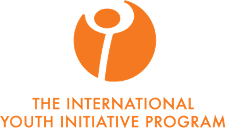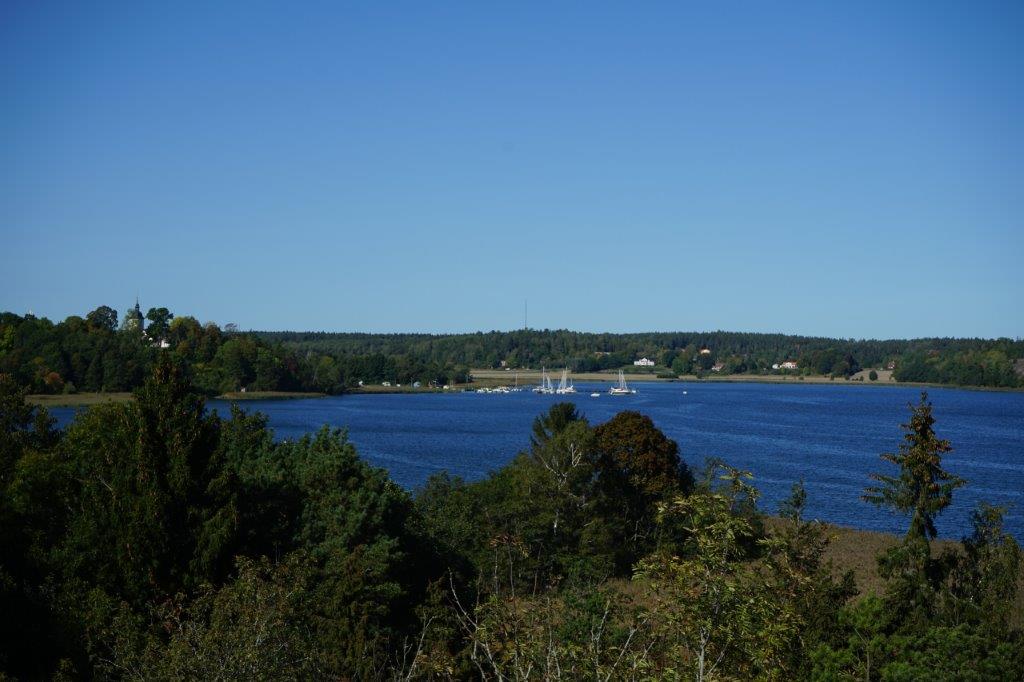
Dear friends of YIP,
Here we are, September behind, the nights getting longer day-by-day, the leaves turning different shades of the autumn colours and the air feeling a bit colder every morning.
Here, where we are, in Ytterjärna. A place that became home for the twenty-one YIP13 participants more than a month ago now and has been warmed by their presence since.
A lot has happened, a lot is happening – getting to know each other, exploring how to live and learn together, diving deep into the various Global Realities courses with a quick turn-over after each week.
Doing movement, picking apples, cooking dinners, finding ways to be creative, asking questions and much more. That’s September. With October already on the go, we’re excited and looking forward to what this next month will bring.
Written by Adéla Honigová
In this newsletter you will find:
- Arriving in Sweden written by Michael Chiunda
- Introduction week written by Petra Oberfrank
- Ecosystems written by Anna Morter
- Activism and Governance written by Bee Reinhold
- War and Conflict written by Christopher Becker
- YIP13 Organising Team
- Food for Thought
Meet YIP13!
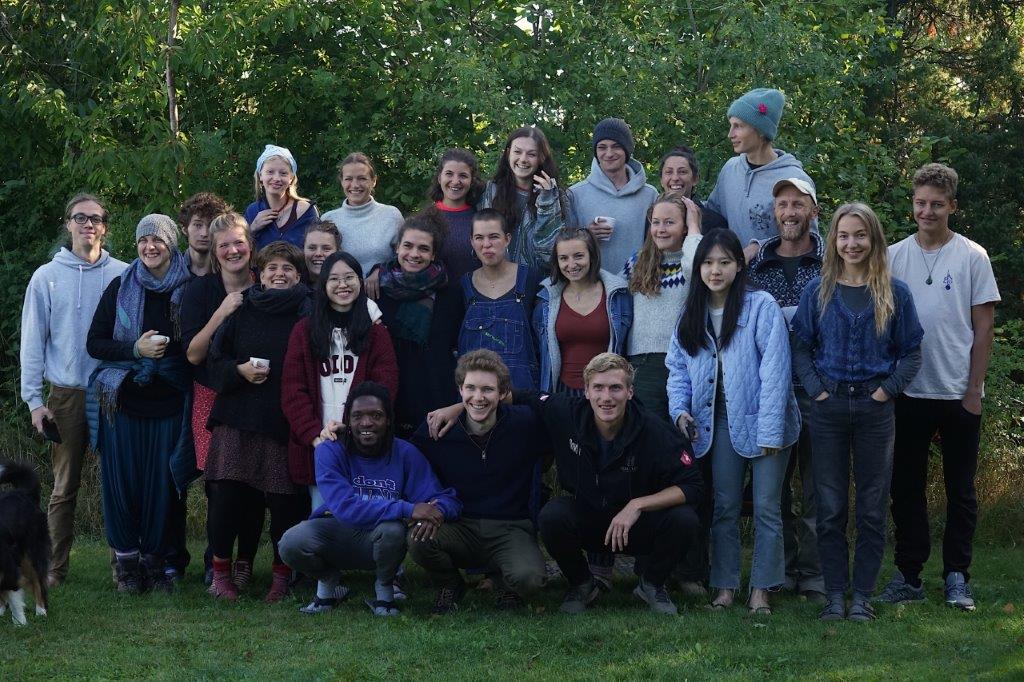
From the left to right, bottom-up:
Michael, Chris, David, Anna, Jiah, Dohyun, Naomi, Petra, Pauline, Bee, Adéla, Mimi, Bianca, Emma, Reinoud, Aaron, Jelmer, Morgan, Ultra, Annie, Cecilia, Wren, Sebastian, Isabel, Severas
(missing in the photo ~ Lilith, Samuel)
If you’d like to get more of a glimpse into who our YIP13 participants are you can go to our instagram and read the ‘Meet YIP13’ series where they answer these three questions:
What is/are the main reasons for you to choose to be here now?
What questions are you holding at the beginning of this journey?
One hope and one challenge and/or a fear that’s alive for you now
Arriving in Sweden
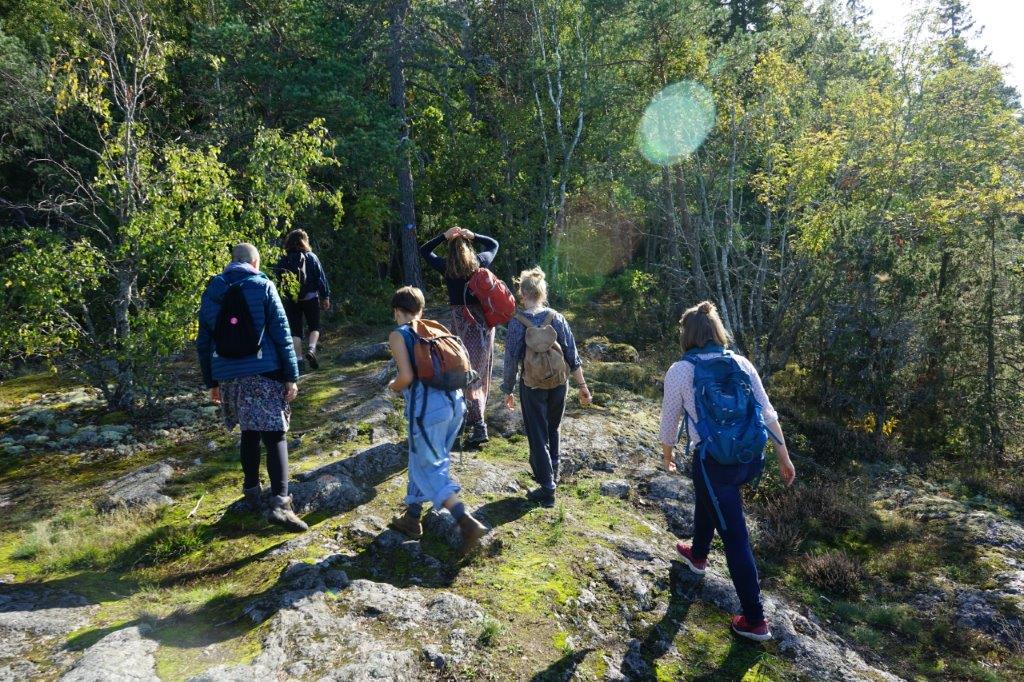
When morning finally came, from a distance, I must have looked like a series of flashing red and green.
The plane: a needle in the air, almost as still as a whisper. I was soaring on the horizon.
For a moment I wished I could taste the fluffy undulated clouds. Some were dispersed and thin, reminding me of Vimbai’s chalking. While others were boastful and defined: ponies and daffodils.
Would they taste like my daydream, cotton-candy? Or would they be as burnt as the carbon dioxide I smoke into them? Beautifully white and ashy. Something felt fair about that quality.
I knew home as it was, I knew home as it was to be. As it is. Both here and there, but neither being a place. Only a feeling.
Written by Michael Chiunda
Introduction week
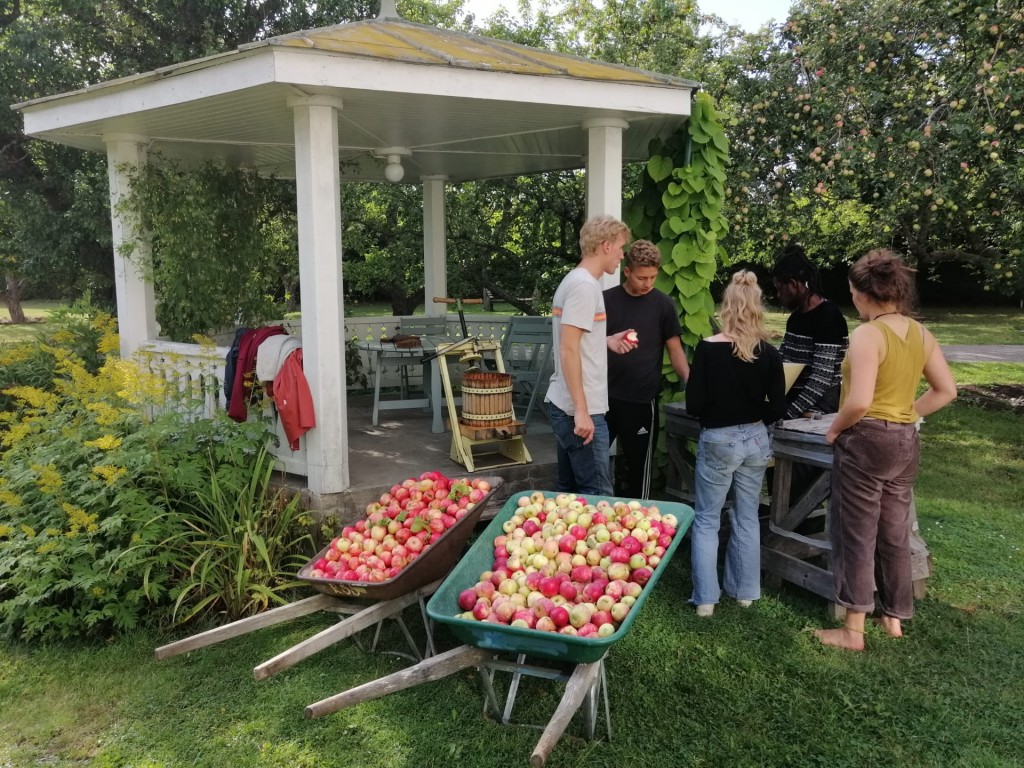
A rainy Saturday is a perfect day to reflect on the past week, the first week of YIP13.
We all came here with questions about the world and this first week just opened up even more questions. After ordinary questions like: ‘Where are you from?’; ‘Why did you come here?’; ‘How old are you?’; we dove into questions like: ‘How would you describe yourself focusing on past, present and future?’. Questions that are always present in you and you need to ask yourself from time to time: ‘What is my destiny?’; ‘Am I in the right place?’; ‘How can I trust the future?’; ‘How can I contribute to creating a better world?’.
The inspiring stories that we heard about Ytterjärna just confirmed that these questions are always there and necessary to discuss. The best thing is that we are going to live here together for the next year, discovering more questions. We are here for each other to discuss them, together with other themes and learning topics.
The end of the week, we gathered in a safe space to share what is inside of us, creating a deeper connection with each other.
Living in a community is very familiar to me. I see the joy and the difficulties of what we could experience together. However, it is different from any other experience I’ve had so far, because the people are unique.
All of us have different talents. This diversity of the group is so beautiful, full of new energies and inspiring souls.
I feel I arrived. This is my place to be for the next 10 months.
Written by Petra Oberfrank
Ecosystems
with Pieter Ploeg and Brigid LeFevre
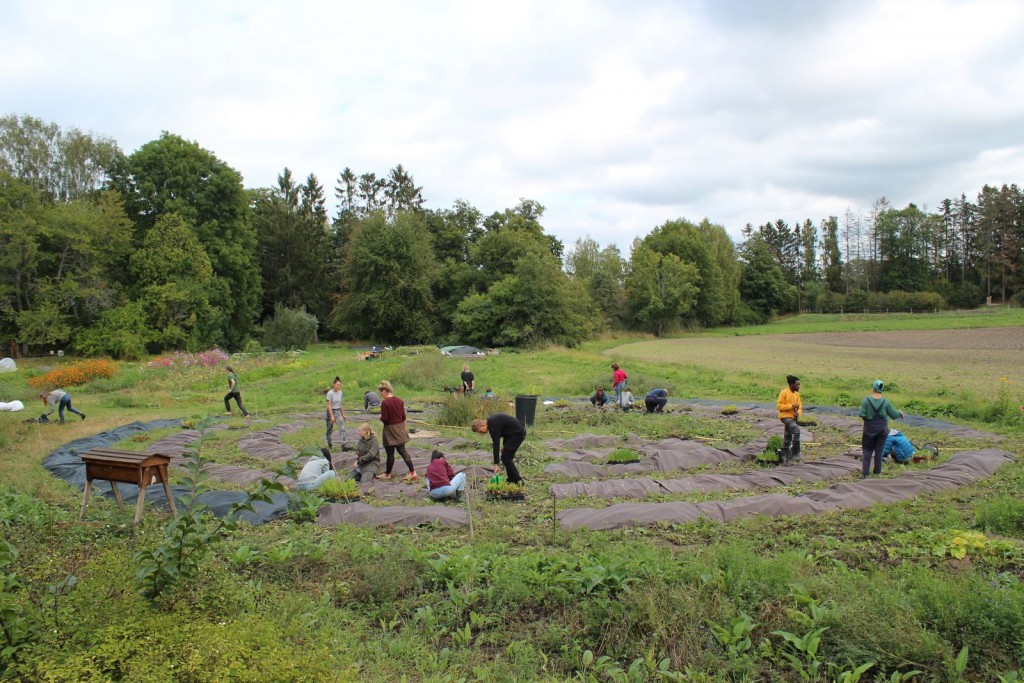
Our first course of the year: Ecosystems.
We started the week taking a journey through time; 4.6 billion years in 4.6 km. From walking on a ball of molten rock to millions of years of nothing but ice, each metre we trod another million years would pass. As time went on, I began to have a deep bodily sense of the difference between the amount of time humans have been on earth and the disproportionate impact we have had on her ecosystems.
Our earth has been through so much change and transition, most of which we have not actually contributed to. Human behaviour and existence felt very small and insignificant in comparison to the ecosystems and living organisms that have adapted to huge environmental changes. What also stayed with me was our immense capacity as humans to create change in a very short space of time.
As the week went on Pieter Ploeg guided us through the changes in our more recent history as we began to understand how human activity, especially at the dawn of the industrial revolution, has led us rapidly into our current planetary crisis.
Since the dawn of agriculture, the primary reason for civilisations collapsing was due to the neglect and degradation of our soils. This was perhaps the biggest reveal for me. However, even given the immensity of this shocking fact, soil is a massive blind spot in our conversation about climate change. Through regenerative agriculture practices we have the ability to sequester a huge amount of carbon from the atmosphere back into the soil. Our lack of engagement with this simple fact felt staggering in the extreme. I was left questioning what might cause the awakening that could create a global shift in our agricultural practices.
To put our theoretical understanding into practice, Brigit LeFevre took us outside. In the garden that can be seen from many of the windows in Tallevana, we started planting a perennial garden that will be harvested and cared for by YIP participants in the years to come.
It was a treat to get our hands in the soil and in a small way start putting our new learned knowledge of regenerative agriculture into action. I felt a sense of grounding when I had my fingers immersed in the soil, and of joy at the simplicity of planting produce that flows in harmony with the surrounding ecosystems. We helped to create a small hub of biodiversity, a gift to the soil and an investment in the future.
In the veg beds we also helped to harvest green beans, courgettes, carrots, tomatoes and dried seed heads. Our awareness was guided to the plants we were harvesting, to look closely at the shape, colours and textures and consciously harvest its fruits. When harvesting the green beans, I enjoyed how slow and careful you had to be to find which direction the bean wanted to be pulled so as not to break the stem or the bean. This felt like a beautiful demonstration of the power of bringing conscious awareness into our relationship with the living world. It highlighted the need to work in harmony with the organisms around us and the guidance that’s offered if we slow down and listen.
I left this week feeling full and rich with experience, ideas and new insight. But primarily, I had real excitement about how a solution to the seeming complexities and challenges of reducing carbon may be available if we bring more of our focus and attention to the soil beneath our feet.
Written by Anna Morter
Activism and Governance
with Kait Ziegler and Gerald Häfner
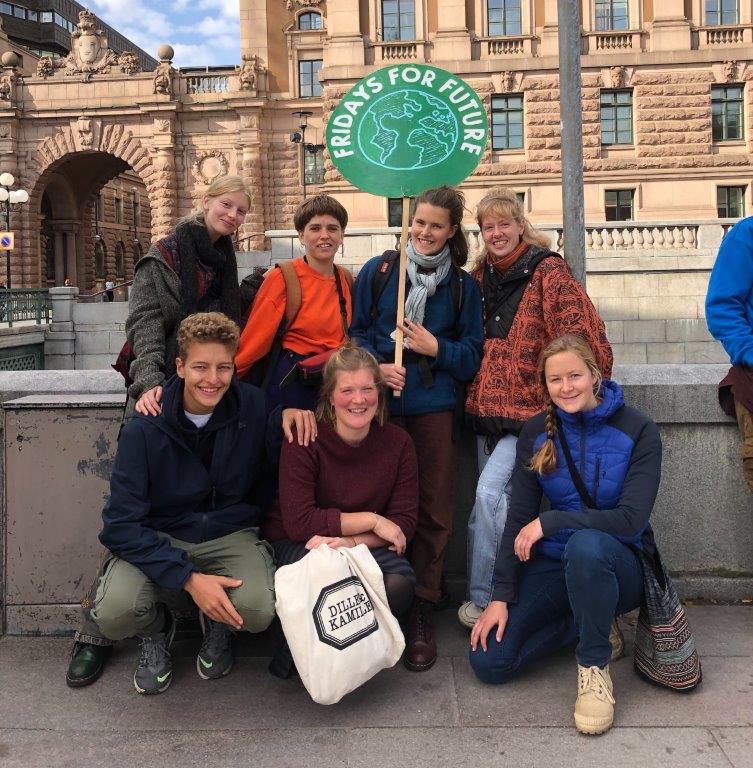
The tree is dying
The tree is dying
We are absent
And lying
Shouldn’t we be present
And trying
To change to a large extent
The world we are living in?
The tree is dying
We are absent
And lying
I hope that one day
I will be free
Deep down in my soul
And be
My higher goal.
The tree is dying
We are absent
And lying
Shouldn’t we be present
And trying
To change to a large extent
The world we are living in?
I don’t know, if you know
But that is my higher goal.
Written by Bee Reinhold
War and Conflict
Christianne Aikins and Ramsay Boly
After having had a course on ecosystems, with very tangible solutions such as regenerative agriculture and soil as blind spot, and a course on governance and activism, where we focused on the root causes of our societal problems, in the third week the focal point was on war and conflict.
For this course Christianne Aikins and Ramsay Boly were our contributors. Fortunately, Christianne could be physically present in Järna, whereas Ramsay, due to the corona restrictions, didn’t have the possibility to be in person with us. He thus called in from Burkina Faso via Zoom.
In a combination of online and face-to-face sessions, we spent three hours per day for one week approaching the immense and broad topic of war and conflict.
The aim of this course was to point out the complexity of the world we are living in and to highlight how biased we are. Using the metaphor of an iceberg, when talking about a conflict or a war we only get to know and understand the visible part of the iceberg. Getting the tools to better approach a conflict and its complexities was one goal of this course.
In order for us to dig deeper into the iceberg, we were first confronted with the system in which our society is embedded. For this we explored key concepts such as the meaning of capitalism, neoliberalism, colonialism, etc. This was an important point, since these concepts are constantly used and often not always understood.
With this knowledge, a critical view on society and our systems was the second step in our attempt to reach the bottom of the iceberg. Here, theoretical notions such as Orientalism, culture talk, discourse à la Foucault, epistemology, etc. permitted us to deconstruct underlying societal dynamics, that perpetuate certain power structures.
By putting on the critical lens given by the mentioned theoretical notions, a new world has opened to us: a world in which complexity and interconnectedness has increased, a world in which narratives and biases on an individual as well as on a societal level has become extremely powerful, a world in which we now have to question these biases and narratives.
Regarding wars and conflicts, by embracing this new world we can understand wars and conflicts and their causes in a more differentiated and manifolded way.
We thank Christianne and Ramsay for the time and effort they put into this course.
Written by Christopher Becker
YIP13 Organising Team
This year we are excited to welcome three new team members for YIP13 organising team.Adéla from YIP12, Naomi from YIP11 and Severas, part-time OT.
Curious to get to know them – visit the team section of our website here.
Food for Thought
“How do you know it doesn’t work if you haven’t even tried?”
Pieter Ploeg (Ecosystems)
“The systems feel much larger than thoughts, when actually they are thoughts.”
Kait Ziegler (Activism)
“We are responsible for both, what we do and also for what we don’t do.”
Gerald Häfner (Governance)
“No one comes to Earth to only do what has been done in the past.”
Gerald Häfner (Governance)
“Language shapes the way we’re able to see the world.”
Christianne Aikins (War & Conflict)
“People having their stories heard and being listened to is very valuable and important.”
Ramsay Boly (War & Conflict)
Looking forward
In the next newsletter you can expect to read more about:
- Power, Privilege and Oppression
- Economic Systems
- Spriritual Ecology and Resilience Thinking
- Art of Hosting
- Imagining the Initiative Forum
